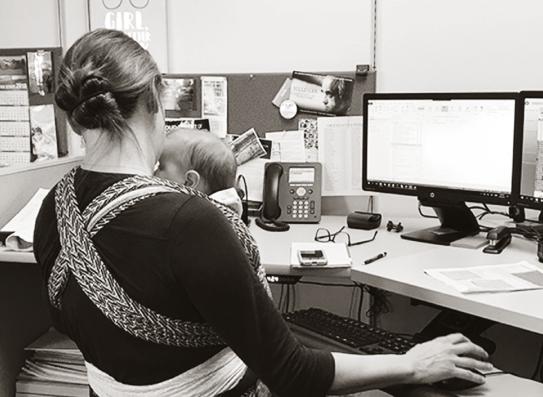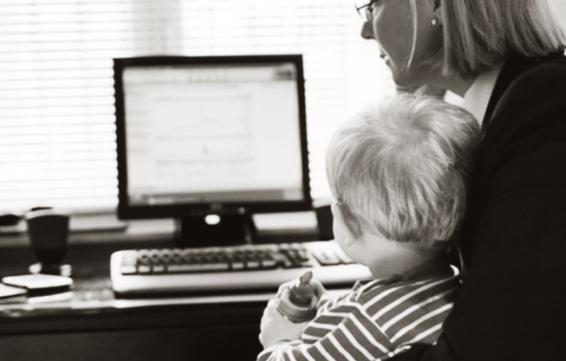工作场合带孩子很少见?的确不该如此
2019-03-26ByKaitlinSolimine
By Kaitlin Solimine
The morning before I was presenting a paper at a Beat Generation1 Studies conference in Paris, the babysitter Id arranged to watch my daughter texted to say she couldnt make it. Worried Id have to cancel the presentation, I asked the organizers, two men, if they knew of any last-minute babysitters.
“Bring her!” they said. “Were fathers of six kids between us. Well watch her.”
So, with trepidation2, I did. While I presented my work in an auditorium, the director and my moderator entertained my daughter by letting her draw on the whiteboard and then,3 to my horror, the walls. During the Q&A;, my daughter demanded to nurse4. As she did, her diaper5 leaked onto my pants. Afterward, several people came up to me to laud6 my bringing her. A middle-aged woman reminisced that one of her favorite memories was bringing her daughter to her thesis defense.7
Unfortunately, my experience is not the norm. For most working women, bringing their children to work or having a flexible schedule is not an option. When flexibility is offered, like in the case of this Londonbased investment banker, it comes with a huge caveat: Advancement is less likely for parents,8 usually mothers, who request flexibility. This can hit single parents—currently 35% of US children live in single-parent households—particularly hard.
在美國,越来越多工作相对弹性的家长把小孩带到工作场合,这也受到越来越多人的接纳和欢迎。事实上,和从前不同的是,人们的工作属性和家庭属性正日益紧密地结合在一起。如何让孩子更好地“适配”于工作场合,是需要正视和解决的社会问题,也是家长寻求工作与生活平衡的新途径。

While one solution may be for companies to offer new parents the ability to bring their babies to their workplace or offer on-site9 childcare, as of 2016, only 200 companies had official policies allowing children to be present at a workplace during working hours. And, of course, there are many industries (construction, factory work, and medicine, for example) where allowing children at the workplace would be dangerous. Moreover, it is often those parents who are in most need of flexibility—single parents or those in low-wage jobs—who are least likely to have it.
I have been deeply privileged to have a partner who works a more traditional job, so I could take time to build a career with more flexibility for child rearing10: I co-founded a remote-work startup, published a novel and went on a book tour, all while a new mother. Yet my partner regularly scoffs11 when I ask him to bring our daughter to work with him—what would his clients think? Company culture and industry standards obviously play a huge role in the “bring a kid to work” idea. When an industry like my partners (real estate finance) is made up almost entirely of men, it becomes even more difficult to shift the culture, though I was pleased to overhear him recently on a call from home say, “Im working from home today, so you may hear my toddler screaming,” which precipitated12 a longer parenting conversation with his client, also a father.
While not common, bringing children to work is a rising phenomenon and seemingly most visible in governance. Take New Zealands prime minister, Jacinda Ardern, for example. Ardern made news for bringing her three-month-old to the UN General Assembly13. Recognizing her circumstances are different from the general publics, she said, “If I can do one thing, and that is to change the way we think about these things, then I will be pleased we have achieved something.”
Likewise, Australian senator Larissa Waters was lauded last year for breastfeeding her baby while voting on a resolution in parliament.14 Closer to home, Illinois senator Tammy Duckworth successfully spearheaded15 a groundbreaking resolution to allow children under the age of one onto the US Senate floor.
In a less deliberate case of workplace-family intersection, theres the viral video of Professor Robert Kellys children bursting onto the scene of his BBC interview.16 The incident raised a variety of questions about why he didnt address the presence of his children as well as arguments about how his wife retrieved17 the children. Interestingly, Kelly said he thought the intrusion of his children meant hed “blown it in front of the whole world.”18 Kellys assumption that the visibility of his children during the interview would somehow tarnish his credibility as an academic speaks to the fact that we still harbor assumptions that our children arent welcome and that its unprofessional to take an interview or a work call while home(yet in a 2016 survey, 43% of working adults said they spent some time working remotely).19
Like the widespread support for Kellys mishap, I am fortunate I never felt my childs presence was offensive to my audience—not even when she ran onto the stage at a literary festival, crawled on my lap and started nursing.20 To the contrary, many students in the audience, especially women, noted it was inspiring and empowering21 that I wasnt ashamed of my intersecting role of mother and professional.
And why should I be? The reality is that most Americans can no longer rely on the traditional nuclear family22 to raise the next generation. Our villages have dissolved, and while we often call on family, friends or, as is usually the case, paid childcare to fill in the gaps, the idea that our work identities are somehow fully separate from our home selves clearly has damaging consequences for all.23 Women often feel like theyre “failing”as mothers and in their careers. “Doing it all” has really just meant the bulk of24 the emotional labor in a household falls to women.
I wonder what the world would look like if children were more integrated into the workplace. What if more parents (and, given the gender pay gap, especially women) had access to resources that allowed them the ability to balance family and career? What if (and heres a big wish) caring for another human being was considered valuable work, even something worthy of mentioning on a résumé?
One of my earliest, fondest memories of my mother is the click of her heels on our hardwood floors on the mornings she readied for work. Although she only worked part-time at a small insurance agency she inherited from her parents, I knew the office well—the smell of burnt coffee, the typewriter Id play with while my mother worked. As a child, I didnt realize how lasting that influence would be, how I respected both my mothers independence at work and also her introduction of me to her working self.
In bringing this generation of children to working events or offices, were teaching them a valuable lesson about work-life balance, as well as the intersecting identities we inhabit25 on a daily basis. My hope is that, when these children become our worlds leaders, theyll remember we didnt shut them out of work spaces. As a result, they will build the policies and support systems for a more equitable and enjoyable workplace.

1. beat generation: 垮掉的一代,指二战后美国出现的一批年轻人,他们对现实生活不满,蔑视传统观念,在服饰和行为方面摒弃常规,追求个性自我表现。
2. trepidation: 惊恐,不安。
3. auditorium: 会堂,礼堂;moderator:(讨论、会议等的)主持人。
4. nurse: (孩子)吃奶。
5. diaper: 尿布。
6. laud: 赞美,称赞。
7. reminisce: 回忆;thesis defense: 论文答辩。
8. caveat:(作决定或行动前必须注意的)警告,告诫;advancement:(事业上的)提升,晋升。
9. on-site: 现场的,就地的。
10. rear: 抚养。
11. scoff: 嘲弄,嘲笑。
12. precipitate: 促成,促使。
13. UN General Assembly: 联合国大会。
14. senator: 参议员;resolution: (会议等的)正式决定,决议。
15. spearhead: 为……带头,当……的先锋。
16. deliberate: 故意的;viral: 像病毒般传播的;burst onto: 突然出現(或来到)。
17. retrieve: 领回。
18. intrusion: 闯入;blow it: 搞砸。
19. 凯利认为在采访过程中,他孩子的出现将会在一定程度上损害他作为学者的公信度,这说明事实上我们还是持有自己的孩子不受欢迎的想法,并且认为在家里进行采访或打工作电话很不专业(但根据2016年的一个调查研究,43%的上班族都远程工作过)。tarnish: 损害,玷污(名誉或形象);credibility:可靠性,可信性;harbor: v. 怀有。
20. mishap: 小事故,小错误;crawl:爬行。
21. empowering: 给予(某人)权力的,使自主的。
22. nuclear family: (由父母与子女组成的)核心家庭,小家庭。
23. 我们的生活社群已经解体,尽管我们经常求助家人、朋友,或通常情况下花钱去找儿童托管来弥补这个缺口,但我们所持的工作属性和家庭属性是完全分开的这一观念显然会产生很严重的后果。dissolve:(使)解体。
24. the bulk of: 大多数,大部分。
25. inhabit: 存在于,身处于。
